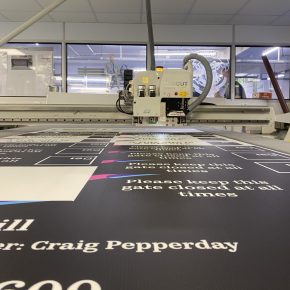
GUEST ARTICLE: The Role of Signage in Construction Waste Reduction
The construction industry is estimated to produce one third of the world’s total waste. With the financial, social and environmental pressures of reducing this figure in mind, Danny Adamson, the Managing Director of Stocksigns, looks at alternative solutions to traditional signage…
It is well-documented that the construction industry contributes to global waste. In the UK alone, a staggering 62% of waste is attributed to construction, with 23% destined for landfill. The urgent need to address this issue has prompted safety signage suppliers to look at how they can help the industry reduce the amount of construction waste it generates.
From the common ‘Construction Site: Keep Out’ to crucial ‘Danger Asbestos’, safety signage is indispensable on a construction site. Unfortunately, these vital signs often contribute to the industry’s waste problem once a project is complete. That is until now.
Through a forward-thinking approach, some signage suppliers are now offering innovative alternatives without compromising the quality of the product.

Closing the loop: recycling in action
Temporary construction signage, manufactured from non-PVC and 100% recyclable materials, is emerging as a game-changer. Once these signs have served their purpose on construction sites, they can be sent to specialist recycling centres instead of going to landfill.
This circular approach effectively eliminates waste and significantly reduces the environmental impact of construction site signage once it is no longer usable or required. Furthermore, the recycled material can be transformed into other products, such as temporary protective flooring, finding a new purpose within the construction industry.
When it comes to construction signage, the traditional cycle of using it and then disposing of it is no longer sustainable. We must start thinking about what happens to these signs once the project is complete.
Partnering for a sustainable future
In order to make the construction industry more sustainable, we need to adapt traditional views about supply chain operations. Instead of seeing suppliers simply as a source of vital resources, we must take a holistic view and appreciate that the environmental actions of manufacturers and suppliers echo up the construction supply chain. To this end, choosing the right supplier to partner with can actively aid your company in meeting environmental targets.
Cutting out construction site wastage by partnering with a supplier that utilises closed-loop systems is on way you lessen your environmental impact, but it is always advisable to investigate the practices, ethics and environmental credentials of all your suppliers before you sign with them.
For contractors, a commitment to sustainability needs to extend beyond just recycling products such as site signs. By choosing suppliers dedicated to closed-loop processes, construction companies can instead contribute to the circular economy and truly mitigate the environmental footprints of their projects.
Latest news

26th July 2024
Enfield Speciality Doors completes world-class project for Atlas Copco HQ
A rundown office and warehouse building completely transformed into a modern headquarters for Atlas Copco has been fitted with more than 120 internal fire doors from Enfield Speciality Doors.
Posted in Access Control & Door Entry Systems, Articles, Building Industry News, Building Products & Structures, Building Systems, Case Studies, Doors, Interior Design & Construction, Interiors, Posts, Restoration & Refurbishment, Retrofit & Renovation, Security and Fire Protection, Sustainability & Energy Efficiency, Timber Buildings and Timber Products, Wooden products
26th July 2024
Abloy UK launches new white paper
Abloy UK, a leading provider of security and access control solutions, has launched a new white paper.
Posted in Access Control & Door Entry Systems, Architectural Ironmongery, Articles, Building Industry News, Building Products & Structures, Building Services, Doors, Facility Management & Building Services, Health & Safety, Information Technology, Innovations & New Products, Publications, Research & Materials Testing, Security and Fire Protection
26th July 2024
MCRMA Member Profile: David Roy, Director of Roofconsult
David Roy of MCRMA member company Roofconsult has more than 50 years’ experience to draw upon working in the building envelope sector and a unique perspective on how it has changed in that time.
Posted in Articles, BIM, Infrastructure & CAD Software, Building Associations & Institutes, Building Industry News, Building Products & Structures, Building Services, Building Systems, Cladding, Information Technology, Restoration & Refurbishment, Retrofit & Renovation, Roofs, Walls
26th July 2024
Strand: Enhancing Door Functionality and Safety
Craig Fox, Sales Director for Strand Hardware, outlines how door industry professionals might apply door limiting stays…
Posted in Architectural Ironmongery, Articles, Building Industry News, Building Products & Structures, Building Services, Doors, Facility Management & Building Services, Health & Safety, Restoration & Refurbishment, Retrofit & Renovation
 Sign up:
Sign up: